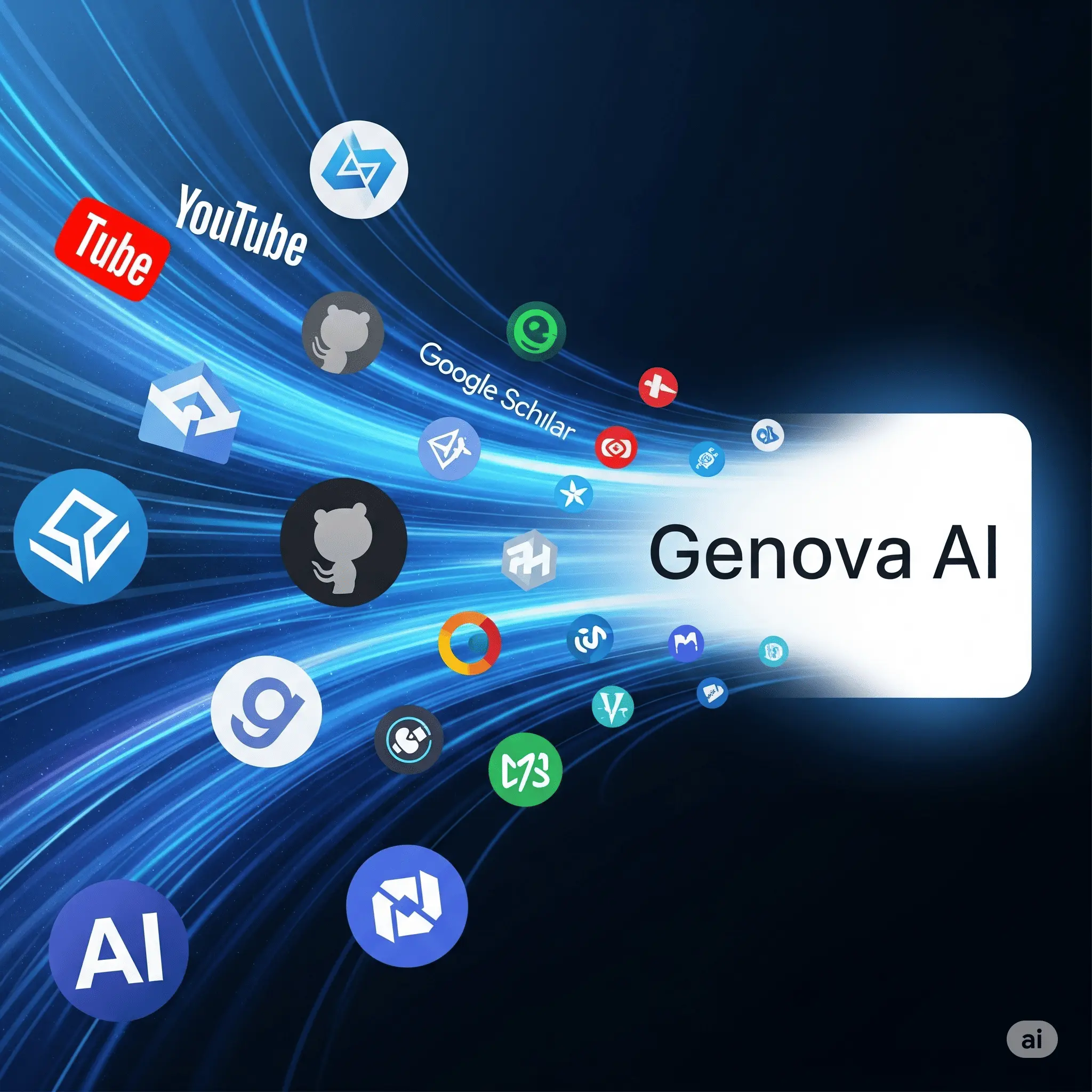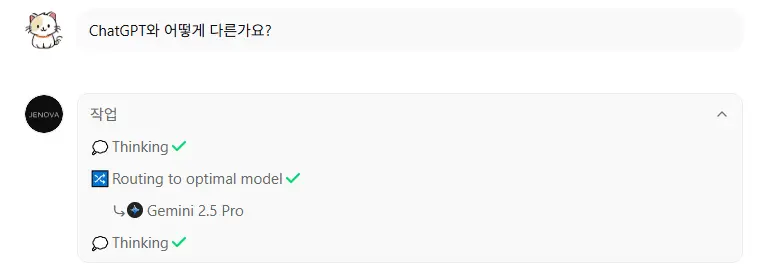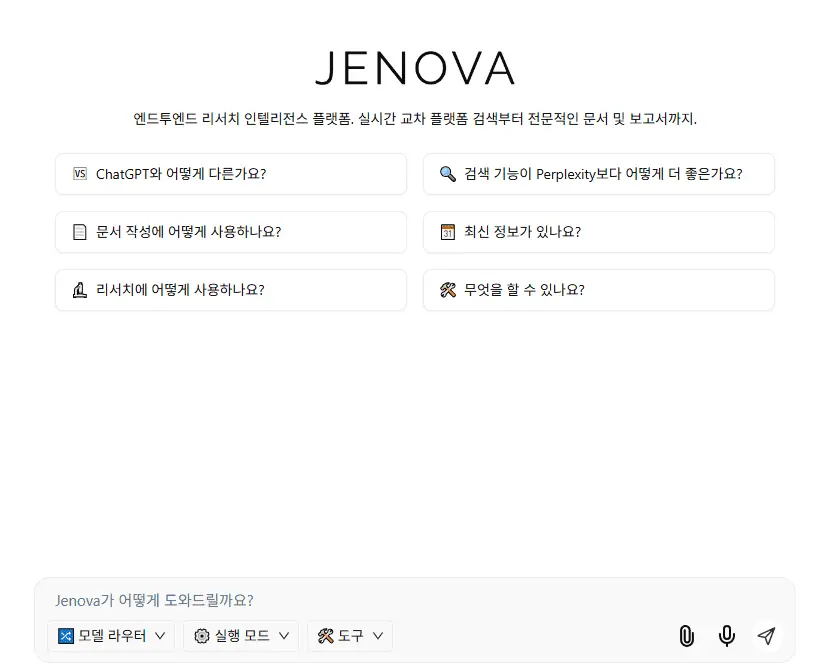Here's good news for everyone who's ever wanted to scream, "I'm done with research!" 🤯 Have you ever been lost in the research abyss, forced to dig through countless websites, YouTube videos, and even the developer's holy land of GitHub and academic papers? If you've pulled all-nighters finding information, organizing it, and then turning it into a presentation or report, then 'Jenova AI,' which we're introducing today, might just be your savior. This smart AI assistant has emerged, billing itself as an "end-to-end research intelligence platform" that goes beyond simple answers. Let's dive in and see how Jenova AI can help us all clock out earlier.
1. Jenova AI, Who Are You?
Jenova AI introduces itself as an "End-to-end research intelligence platform." The keywords here are 'Research' and 'Intelligence.' While existing AI chatbots have been limited to answering fragmented questions, Jenova aims to integrate the entire process from information gathering, analysis, and synthesis to creating the final output (reports, presentations) into a single flow.
Think about the pain points we usually face during research. Google searches are a given, but for the latest trends, you have to scour YouTube or Reddit. For technical details, you need to check GitHub, and for reliable information, you look for papers on Google Scholar. The process of reading, summarizing, and neatly transferring all this data into a PowerPoint is... exhausting just to imagine. 😫 Jenova presents a vision to break down these 'Digital Silos'—the walls of scattered information—and allows you to handle everything on one platform.
"Jenova goes beyond simply finding information—it packages your insights into presentation-ready formats, saving you hours of manual formatting and design work." – From Jenova AI's Official Introduction
2. Jenova AI's 3 Core Weapons ⚔️
To achieve this ambitious goal, Jenova AI showcases three main core features.

- Cross-Platform Research: As mentioned, this is Jenova's biggest feature. It deeply integrates and analyzes not only general web search but also YouTube (video content), Reddit (community insights), GitHub (code and technical documents), Google Scholar (academic materials), and Google Maps (location-based intelligence). This means you can ask complex questions like, "Tell me about the latest AI technology trends, referencing GitHub and relevant academic papers."
- The Best AI Models on Deck: Jenova doesn't rely on a single AI model. It is equipped with all the top-tier AI models available today, including OpenAI's GPT-4o, Anthropic's Claude 3.5, and Google's Gemini 1.5. It intelligently selects the most suitable model for the user's query or task. For instance, it might use Claude for creative ideas and GPT for complex data analysis, ensuring the user always gets the best possible output.
- Automatic Generation of Professional Documents: The final step of research is always 'reporting.' This is where Jenova truly shines. Based on the researched and analyzed content, it can quickly generate a draft of a report or presentation, complete with relevant visuals, charts, and images. No more staring at a blank PowerPoint slide, feeling overwhelmed. ✍️➡️📄
3. What Makes Jenova AI Different? (feat. ChatGPT, Perplexity)
You might be thinking, "So, how is this different from just using ChatGPT or Perplexity?" Let's break down the key differentiators.

1) From 'Answer Engine' to 'Research Assistant'
ChatGPT and Claude are excellent 'conversational partners' and 'answer engines.' They excel at generating creative or logical answers to specific questions. However, they fundamentally play a passive role, responding when a user asks.
In contrast, Jenova AI is more like an 'active assistant' with the clear purpose of 'research.' It goes beyond simply providing answers to automate the entire workflow—from information gathering and analysis to document generation—helping the user achieve their final goal.
2) Depth and Specialization of Information Sources
Perplexity and other search-enhanced AIs have the strength of scouring the 'general web' to find the latest information. However, their sources are often limited to general web pages.
Jenova AI goes a step further by directly analyzing specialized information sources like YouTube, GitHub, and academic papers. This means it's capable of much deeper qualitative and technical analysis, such as summarizing the content of a YouTube video or analyzing the code in a GitHub repository, not just fetching links.
3) The Final Output: 'Actionable Documents,' Not Just 'Text'
Most AI services provide 'text' as their final output. The user then has to do the additional work of copying this text, pasting it into Word or PowerPoint, and formatting it nicely.
Jenova AI's biggest differentiator is that it solves this 'last mile problem.' By generating a ready-to-use report or presentation draft based on the analyzed content, it allows the user to focus on the core task of refining ideas and enhancing the content.
Key Takeaway
Jenova AI is not just a search tool. It's more like an integrated 'research assistant' that gathers scattered information (Cross-Platform), analyzes it with the optimal AI (Multi-Model), and automatically creates the output (Document Generation).
4. So, How Do You Use It? (A Quick Guide)
You can currently try Jenova AI for free on its official website. The usage is very intuitive. You just have to request what you want as if you were talking to a chatbot.
For example, you can get more satisfactory results by being specific with your requests, like, "Find five trendy AI-based marketing automation tools, and create a presentation draft that includes a table comparing their pros and cons. Please also refer to YouTube review videos."
## Try asking Jenova AI like this (Example Prompts)
**1. Market Research & Report Generation**
"Research the global UMPC (Ultra-Mobile PC) market trends for 2025. Include key players, market size forecasts, and the latest technology trends. Organize it into a Word document and attach links to a few relevant YouTube review videos."
**2. Technical Analysis & Code Research**
"Explain the technical differences between WebSocket and Socket.IO, and provide use cases for each with real project examples from GitHub. Please include a performance comparison chart."
**3. Academic Material Summary**
"Find three recent academic papers on 'Optimistic UI,' summarize their key findings, and explain the pros, cons, and future prospects of this technology."When you make a request like the ones above, Jenova will collect information across various platforms and present the results in the form of a neatly organized document or presentation. A major advantage is that it offers various plans, from a free plan to custom enterprise plans, making it accessible for individual users and teams to get started without a burden.
5. Conclusion: Beyond Simple Search to the Age of 'Intelligence'
Jenova AI represents an ambitious attempt to expand the paradigm of 'search' to 'research.' In an era where we are drowning in a flood of information, could it become a reliable assistant that weaves scattered pieces of knowledge into a single, meaningful 'treasure'? 💎
Of course, like any AI, it can't be perfect. However, Jenova AI is worth paying attention to for its potential to drastically reduce the enormous time and effort spent on research and documentation. If you're tired of repetitive research tasks or want to gain deeper insights, why not experience the 'new world of research' with Jenova AI today? Here's to you clocking out on time! 😉
